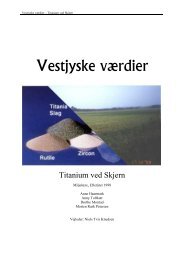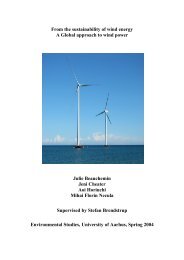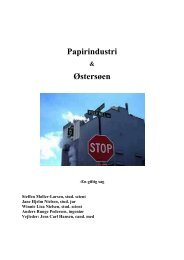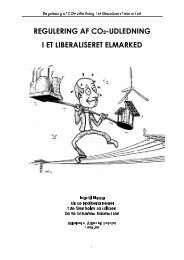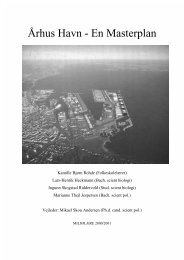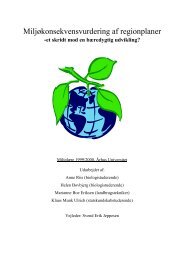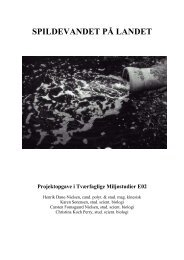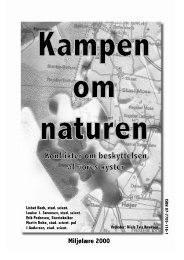University of Aarhus ECOTOURISM AS A WAY TO PROTECT ...
University of Aarhus ECOTOURISM AS A WAY TO PROTECT ...
University of Aarhus ECOTOURISM AS A WAY TO PROTECT ...
You also want an ePaper? Increase the reach of your titles
YUMPU automatically turns print PDFs into web optimized ePapers that Google loves.
Ecotourism as a sustainable way to protect nature<br />
empowerment. Communities will perhaps try to preserve their traditional culture<br />
because <strong>of</strong> outside visitor’s interest. Traditional culture demonstration is one <strong>of</strong><br />
several income sources, tied to the local community in ecotourism (Sven, 2000).<br />
It is one <strong>of</strong> several reasons that tourists plan to travelling to protected areas<br />
(Joseph, 1997).<br />
The sustainability <strong>of</strong> ecotourism is very dependent on tourism<br />
management strategies. The “carrying capacity” concept may be very useful and<br />
should be implemented in the tourism management strategy. It is really needed<br />
to define the limit levels that the whole ecosystems can tolerate. In order to do<br />
that, we need to focus our attention on the whole ecotourism system, including<br />
local capacity building, susceptibility <strong>of</strong> the natural ecosystem, sensitivity <strong>of</strong> the<br />
local culture, etc. But it is very difficult to define different kinds <strong>of</strong> tourism.<br />
Therefore, the “carrying capacity” needs to be very flexible and adaptable to<br />
different tourism situations. Weaver (2001) has also agreed with our ideas and<br />
emphasised that the carrying capacity could not be fixed.<br />
Carrying capacity alone may not be enough to ensure success in the<br />
control <strong>of</strong> ecotourism impacts. The flexible and dependable actions sometimes<br />
succeed ant other times they do not. It depends very much on the whole capacity<br />
building and also on the individual participant. Every participant has their own<br />
skill to carry out ecotourism activities. Some can do well and some cannot. The<br />
emergent local guides at The Galapagos Islands could not control well the<br />
visitors because <strong>of</strong> lacking education (Honey, 1999). This evidence indicates<br />
that how importance <strong>of</strong> capacity building is. If capacity building is ignored,<br />
long-term negative impacts will be accumulated and lead to expose to the<br />
ecotourism environment later. This is called “accumulated impacts” from<br />
ecotourism.<br />
76



